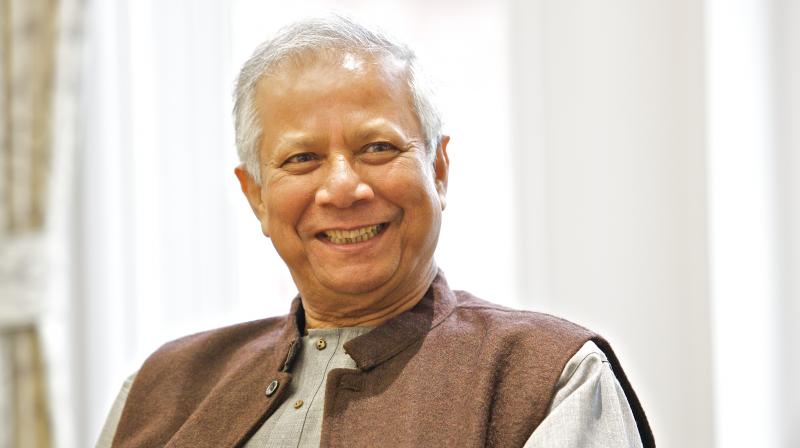Muhammad Yunus & changing the world, one business at a time
The Social Business Day conference, which takes place in Dhaka every year, is being hosted in the city for the first time.

Bengaluru: “I look at everything the banking system does, learn about it piece by piece. Then I do the exact opposite.” Nobel Laureate Muhammad Yunus, the pioneer of microcredit and banking systems that “lend to the poor,” shocked the world by bringing what appeared to be a Utopian dream to life. The model continues to thrive: only last week, Bengaluru-based company, CreditAccess Grameen, received a go-ahead from market-regulator SEBI to float its initial public offer.
It is well-timed with Professor Yunus’ visit to Bengaluru, also a historic trip for social business. The Social Business Day conference, which takes place in Dhaka every year, is being hosted in the city for the first time.
The surge of enthusiasm that carried the idea forward met with its share of challenges and criticisms, from 'debt-traps' to loan-sharks. "You can quote me on this," said Professor Yunus, at a select gathering on Wednesday morning. "Microcredit institutions should have a social cause. They should not be used as a means for personal profit." Professor Yunus' newest financial model one that aims to his 'Three Zeroes' solution, looks at completely profit-free investments. "The investing company gets its investment back. All future profits are ploughed back into the social business."
An idealistic model perhaps? "Of course it's idealistic, there's nothing wrong with that," Professor Yunus says at once. "I have been called utopian and been described as detached from reality. How can that be said? Every day, I deal with ground realities. That's where my ideas come from."
That Infosys will host the Social Business Day conference, the traditional annual event put together by Grameen, is a mark of some irony. The dangers of Artificial Intelligence is one of the central aspects of the gathering, which comprises delegates from across the world. The changes will be sweeping and fast, Professor Yunus declares, "it will cost us millions of jobs. We're rather busy gloating about a world where machines will do everything for us and we won't have to work. If I have no work, who will feed me? What happens when AI is more intelligent than me?" The idea of a Universal Basic Income has been discussed and Professor Yunus dismisses it at once. "Is this our destiny? To take handouts and live as second-rate citizens? No." The concentration of wealth, he says, is only growing worse, "wealth is centered in fewer and fewer hands and countries. It's time to reverse the process."
The problem of poverty, Professor Yunus believes, is part technological and part economic. "The poor cannot be blamed for poverty when the system we live in is so flawed." The dangers posed by AI are only compounded by basic economic theory, where, Professor Yunus says, "Human beings are made to believe that mankind is, at its core, acquisitive and selfish. That we cannot function outside of these traits and our only destiny is to go out and find a job. Why should that be the case? Human beings are, historically speaking, survivors. We're farmers, go-getters, hunters and gatherers, entrepreneurs in every sense. Why sit back and let this happen?"
When the Nobel Laureate was told by a university, as a point of pride, that they produce "job-ready youngsters," his response was one of total alarm. "What a shame," he said. "What happened to producing young people who are life-ready? Give youngsters the choice of entrepreneurship. We’re happy to criticise a system that puts wealth in the hands of a few but we’re its mercenaries too, if we don’t act.”

